Married duo Molly Venter and Eben Pariser of Goodnight Moonshine will perform at Caffe Lena on Friday, February 7.
Goodnight Moonshine is a guitar and vocal duet and a musical marriage in all senses. The duo combines the evocative voice and songwriting of Venter, with Pariser’s adventurous guitar playing. The result is folk music with a depth of improvisation and tonal subtlety usually reserved for jazz.
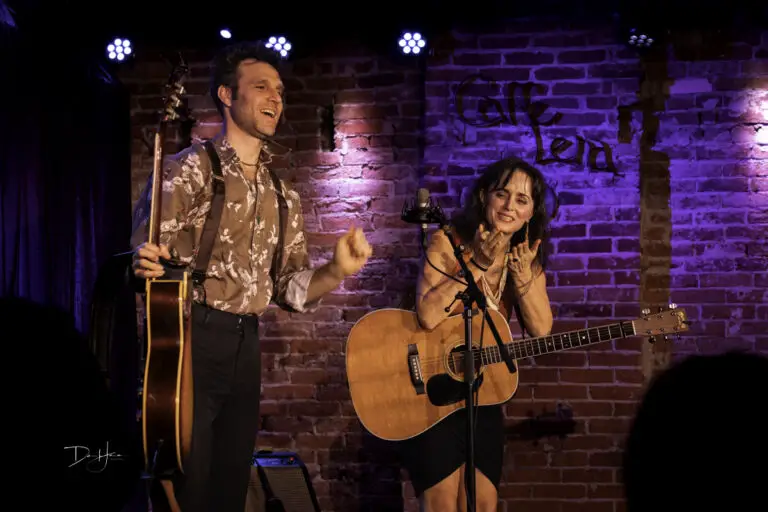
Goodnight Moonshine’s latest single, “My Sister Evangeline,” features the Red Molly ladies: Laurie MacAllister on harmony vocals and Abbie Gardner on Dobro. It’s currently spinning on NPR and Americana radio stations across the country.
Goodnight Moonshine crafts songs like a delicate whisper to the soul. It weaves through the threads of vulnerability, love, and connection into sound that continues to linger in your head and heart long after the music fades.
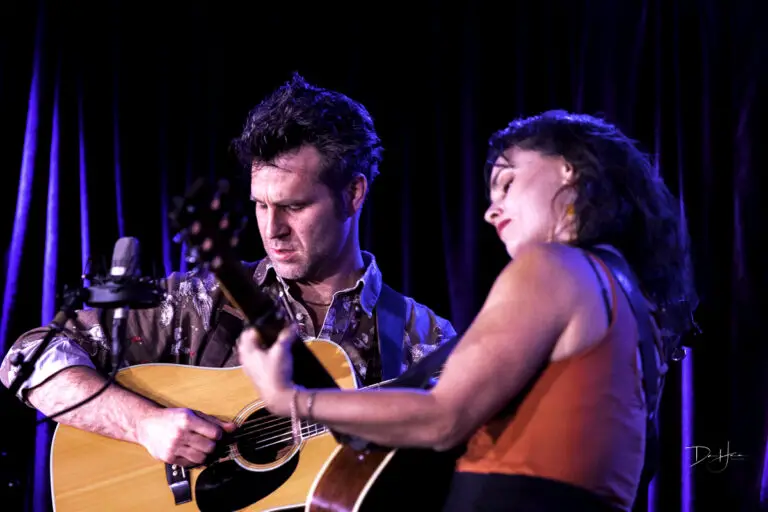
NYS Music had a conversation with Venter about the duo’s creative processes, responsive shows, songwriting philosophies, and more. Here’s the full interview:
Daniel Joffe: Your music as Goodnight Moonshine is deeply personal and explores your relationship, creativity, and shared journey. The latest release, “My Sister Evangeline” is a love song about family patterns and self-actualization. How do you balance vulnerability with the desire to create something universally relatable?
Molly Venter: I’m not that heady with my songwriting, and I don’t really have desires, I mostly just have a process, and my songwriting process yields what it yields. After the facts, in more of the editing phase, I might think more about things like that. Here’s how it works for me, and it’s always worked this way; I sit down at the guitar and I start strumming, I start making sounds, those sounds eventually turn to syllables, and the more that I run that, and it feels good in my body, and makes sounds that I like listening to; the syllables start turning into words and sentences, and then I go “Oh! That’s what this song is about! That’s what wants to be talked about right now.” I never go in with an idea, and 99 percent of the time, this is how it happens. And so, in my younger years, what was on my heart, what was coming out was romantic stuff and personal stuff and it would come out. But people would say that they would resonate with it so strongly, and there were specific details from my life often, and even details that were made up but felt true, and feeling true is also true. And I think that because it’s always coming from such an authentic place, and not my ego wanting to say something, thinking I should say something rather than wanting to say something, but really the creative process unfolding through me, people would say that it felt very relatable.
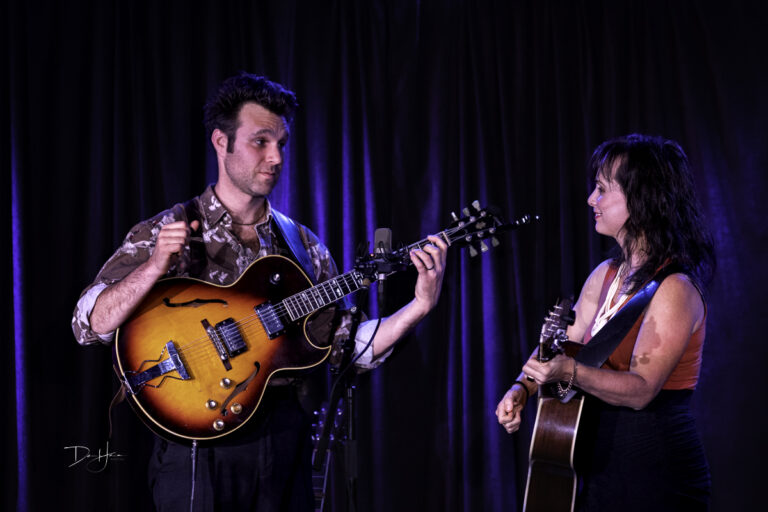
Those early records were people’s favorite records to have a divorce and breakup to. As I got older, and having less struggle in my personal life, things would start to happen with the songs. The first time this happened was in the song “Good Mother,” and I started writing and I realized, oh… this is a song about my best friend’s mom who has Alzheimer’s. That song came through in my mid-twenties, and people would say how do you know that perspective? I would say that I wasn’t too sure, it comes out when I’m relaxed and allowing myself to do that. And “My Sister Evangeline” is interesting, because again, most of the songs I sort of know where they’re coming from. They’re coming from me having a feeling about society, or me having a deep connection with my child, or me thinking about it. Death, and “My Sister Evangeline” came out, and I thought that it was funny because it‘s a story but not about me, I don’t have a story, yet I did live in Texas for ten years, so I think you fill the well with whatever you expose yourself to. You read good novels, you take in travels, and all these images go inside, and mix around, and mix with everything swirling around, the ether, and the song came out, and I was thinking that it’s such a cool and interesting song, yet I didn’t know what It was about. And then, as we were recording it, Evan turned to me and said, “Is…Is this a song about me and my brother?” and I go, “Oh… yeah, yeah, I think it is.” And the details are completely different, completely different, but the emotional space I think came from there, and so it’s a really fun process of exploration, and I don’t have much of an idea of balancing the personal with the universal, but I will say, if something feels really authentic and true, even if it has a lot of emotion in it, it resonates with other people. I don’t ever have to worry about the balance, it just is what it is.
DJ: I completely agree. I think the best songwriting comes from authenticity and being genuine. Being able to go into songwriting somewhat blind-sighted and unsure of what’s to come of the song, using your initial gut feelings to have the song formulate itself, and if you make the music for yourself, it’ll naturally resonate with others.
MV: Exactly, if they’re on a similar wavelength or have similar experiences, it will resonate, so why would I try? I don’t know who I‘m singing for, but if I’m experiencing it, someone out there is also experiencing it, that’s generally true. For my editing process, In my younger years, I would just let it rip, it came out, and it’s done. I would say “That’s good enough,” because I didn’t want to get into the minutiae of the craft and make it so perfect. Yet, I read something by George Sonders, “A Swim in a Pond in the Rain: In Which Four Russians Give a Master Class on Writing, Reading, and Life” and he teaches Russian literature, and a writing process, and it’s so great and somatic, and informed my whole organism. You write what you write, and you come back and read it or come back and play the song the next day. Say there is a meter on your head, that can go in the green when you’re going along and enjoying the work, then the meter flips into the red when there’s something that ticks you off or doesn’t feel right. The first thing to do is to admit that there’s something wrong with dipping the meter into the red. Often, something spontaneously else offers to take up that place, and then you go in. For me, it’s a process of vocalizing something that comes out, letting it come out, going through the song, coming back to it the next day, and seeing if there’s something still in the red that can be changed. Over time, it’s an iterative process. The work you put out becomes more and more true for you.
DJ: I think that’s a very interesting and unconventional editing process. As well, lots of that can be applied to real-life scenarios. Being able to go back and reflect on certain decisions and thoughts, be able to reconvene with yourself and recognize your emotions to see from a broader perspective what’s annoying you, and be able to target what it is that’s dipping your meter into the red.
MV: That’s amazing you said that because when he said the first step is to admit that some things are not quite right, it’s easier to do that in songwriting but a little harder to do in real life. I can either pretend it’s fine or beat myself up for it. Neither is useful for songwriting nor real life.
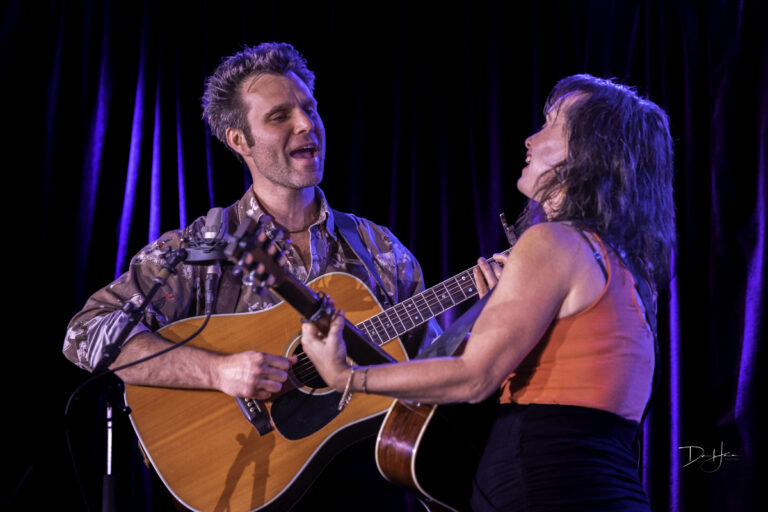
DJ: Your performances are known for the “hypnotic trance” of your vocal and guitar interplay. How do you cultivate that level of deep connection and responsiveness during a live show?
MV: The short answer is we meditate before the shows. The longer answer would be that it’s a process of building trust and learning the skills of being able to listen and talk at the same time. Of course, I would’ve thought that this song is mine and it’s all about me so I’m going to do my thing, so I’ve had to listen and be open when working with other people. I think Eben, having a crazy ear, was and is somewhat sensitive to my sound, and learning to stay informed about each other’s sound and songwriting has been a development process.
DJ: How long have you been meditating for?
MV: I’m like 44 now and was introduced to it in my 20’s. I did a ten-day silent meditation retreat in my mid-20s, I lived in Austin for 10 years, so everybody said, “This is what you’re doing for fun?” I got away from it, and when I met Eben in our early 30s, I got him into it, his dad is a meditator, but it took a girlfriend for him to get hooked. I came back to it more recently to save my sanity, and I also know hypnosis. For a while, I was doing hypnotic inductions for us before going on stage, and it was really good before the show because it would get me grounded and get Eben in the right zone, but that started feeling like too much work for me, so now we can both just drop into our meditation and get to where we need to go.
DJ: Yeah, that’s awesome. Meditation can most definitely take you to a very different and spiritual place.
MV: Do you like to meditate?
DJ: I’ve meditated on and off over the years. It’s a struggle for me to sit still, yet it’s very helpful to stay grounded and reflect on your thinking.
MV: As that type of brain, we can call creative or ADHD, I just started meditating with a weighted blanket, and it would help my physiology settle down, and then I could just continue to let go and let go.
DJ: The guitar-and-vocal duo format is rare. What challenges or freedoms do you find in creating music with such an intimate setup compared to larger ensembles or studio productions?
MV: The challenge is that we both have to work really hard to keep focus. Maximum focus maximum energy from both of us. With a band, you can kind of feed off each other’s good vibes. With two people, it’s a big effort to stay focused and energized, even if you had a weird day or are sick. The freedom is that, with just two of us, it creates a non-hierarchical presentation of music, where it really is a back-and-forth. When he’s playing the guitar, and I’m singing the melody, it’s not to enhance what I’m doing. Were both expanding off what each of us was doing. There’s just the two of us and the kids, so we can sort of just pop out wherever and rehearse music whenever the kids are napping. When you have more people in your band, it’s a harder balance to strike between everyone having an equal voice, but you can have that with a duo.
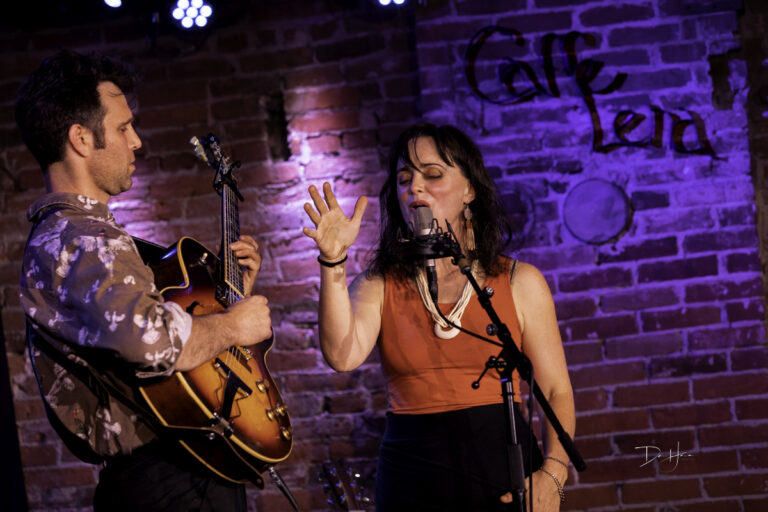
DJ: How has your creative partnership as a married couple evolved, both in music and life? Do you find the boundaries between the two blurring or reinforcing one another?
MV: It was the hardest thing we did together at first. It’s a very personal expression, and you have these strong ideas, and if you talk to anyone who is in a band, they say it’s like a marriage. Then you add a marriage on top of what’s already a marriage, it is double intense. I remember an early sound check, and it was so fraught, and even trying to rehearse, my tone towards music can’t be the same tone when talking about the dishwasher. I get to be a little snappy in my personal life since it is safe, and I shouldn’t, I should be kind all the time, but I’m not always the kindest, most thoughtful, and considerate, I’m working on it. But you have to be when you’re doing a creative process because you’ll hurt their feelings. I’m not going to hurt Eben’s feelings by bitching at him about the trash, but I am if I’m using that kind of flippancy around our creative process. We have to put on different hats, but what I will say is it was the hardest thing we did, and then in 2020 we had a four-year-old, and we had twins and the pandemic, so since then, we’ve had to become teammates on such an intense level, that music is the easiest and greatest point of collaboration to do together.
DJ: I think being in a relationship would help you to be more vocal with what you want and be able to compromise with each other on certain disagreements.
MV: Yeah, that would be the goal. It for sure feels like you can express certain things, so having certain positive attitudes in a specific context. The challenge is to hold each other to our best selves. We deeply deeply respect each other’s artistry and were, of course, better at different things in our collaboration and music. What that means is that when I come in and hear something on the recording, and I say, “Mhh, I don’t know,” he’ll not want to admit that there’s something not as great as it could be and might need some change, but because it’s me, and at the end of the day we trust each other, we both know it’s the right things for the song. I don’t feel like I’m compromising to make him happy by changing the chords, I’m compromising because I know it makes it better. It feels less personal because of the foundation of respect that we have, versus in a band I was in before, it was very tit for tat, and if you like doing something, you do it, and if I like doing this, we’re gonna do it for me later. But with me and Eben, we know what’s best for the song. We don’t always agree at first, but we get there.
DJ: The philosophy of “making space for each other while staying true to yourselves” is central to both music and marriage. How may this philosophy guide your creative decisions and personal dynamics?
MV: Like I said, it almost comes back to talking and listening at the same time. There are aspects in which I can take the lead with phrasing and tone, and it’s very easy to let Eben take charge for a different strumming pattern, new arrangements, and chord substitutions, and there are ways that it is obvious the other person knows more and cares more frankly. I think it’s generally easy musically to stay true to ourselves if you talk about the aspect of the business and what to do to show up online, that’s more where it gets sticky since we have such different styles of working. Music has become the easy part; we’re not just doing music; we’re attempting to play shows with other people and pay our bills with it. Those considerations are a lot trickier but also resemble any old marriage, and how you’re gonna learn to balance your style of parenting and keeping a house clean. The grunt work or businessy side of music is nuts and bolts and how you’re gonna make it work. Creatively it’s always about how you can be the most expressed, it’s never going to diminish me. You being the most expressed musically, will never diminish me. Getting your way with the house might take time away from other things, but music is a win-win.
DJ: You don’t find the same issues in practicing that creative process that you do in normal workday stuff and trying to reach out to media and working on the business part of things, it’s a different way of collaborating.
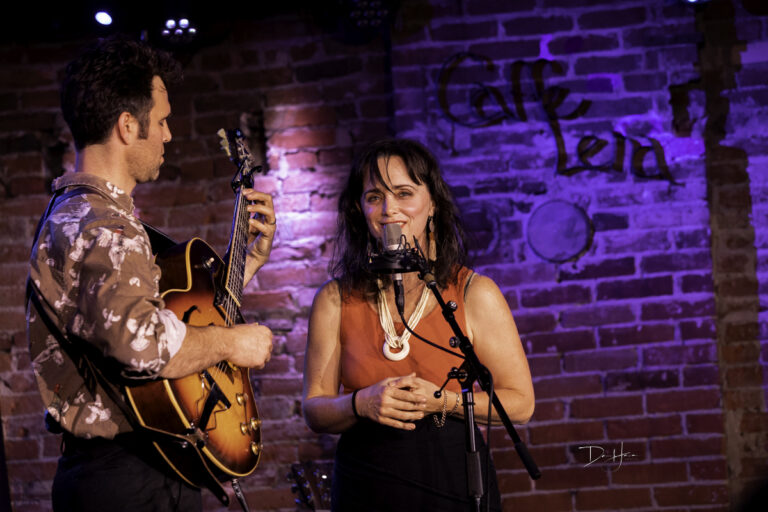
MV: It is a different way of collaborating. It’s funny you say that, I guess whenever we’re rehearsing or recording, I won’t necessarily want to run something 8-10 times, that will get boring for me, but that’s what he needs to be able to do, he’s the type of the guitar player where he’s like here’s the song. If you want it to immediately sound nice, he’s not your guy. It’s gonna sound weird and off and crunchy, and then eventually it’ll get to something great and new, but it’s going to take a while, and that’s where there’s a compromise something, it’s a working up of the music.
DJ: Having experimented with studio production and live acoustic formats, where do you see Goodnight Moonshine’s sound evolving in the future?
MV: This upcoming record is a good example, we went in to hone our live performances with two guitars and two voices, so can we capture that magic old-fashioned? Going in there, recording it all live at the same time, mic it up, and catch lightning. We spent a good long time at that effort, and for half of the record we did, we caught lightning like that’s magic. I’m not saying that everything is perfect, but we got the magic for that song, this moment, for today. So, we might go back and add a little bass to something and lift it here and there, but those songs are just perfectly what we intended. There were other songs that we just hammer and hammer and hammer, and it works in a live context, but in a recorded state of the song, it just wasn’t quite big enough. So then, we still did record it all together, but we went back and brought in a fantastic jazz drummer, Ryan Sands, with whom Eben has a side-jazz project with. We did the backward thing where we didn’t just lay drum tracks first, then lay guitars, then voices. It’s still the core of us, but we did need more support for those songs. And those songs are going to be the biggest, funniest cacophonies on the record, and the other ones are little perfect statements. So, where we’ll go in the future is as long as it’s serving the song, as long as the song is at the core, same with live performing, and as long as our live duo performance is incredible, then as we add people, it will continue to add and enhance it. Whereas I think where we were 8 years ago, it was kind of “meh,” as just the two of us, so let’s go out with a bass and drums, it’ll be like a rock band, and it’ll be a fuller sound. Now, what’s at the core is at the core, and then what we add to it, which is a little jazzy, will be what serves the song.


Comments are closed.